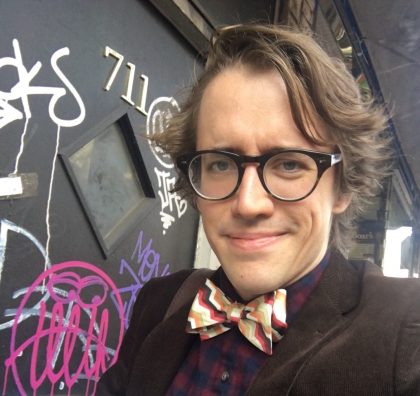A fantasy of Elsewhere vs the reality of Here: revisiting The Odyssey in pandemic-induced isolation
“Staying Here may be our only option during the current pandemic, but it would be too simple to declare this the only right answer for all time.”
It’s weird—yes, everything is weird now—to try to think about the colonization of Elsewhere while in pandemic-induced stationary isolation. On the one hand: wouldn’t it be great to get out of Here, which is small and cramped and toxic? (My Here is a one-bedroom apartment in Brooklyn, from which the skyscrapers of Manhattan now seem light-years distant.) On the other hand: how the hell could we even consider going Elsewhere, given that we control Here so poorly that we can’t even go across town?
This is the context in which you, reader, will hear news of my article called “Speculative Fiction, Ecocriticism, and the Wanderings of Odysseus.” Were I to retitle it for the COVID-19 era, I’d go with something like “Allow the fantasy of Elsewhere to convince you that staying Here isn’t so bad after all.”
That’s clearly the message of Kim Stanley Robinson’s Aurora (2015). A spaceship arrives at the planet Aurora after a generations-long flight from Earth. At first this New World seems okay, albeit excessively windy. Soon, however, the astronauts suffer a truly horrific revelation: there is a miniscule viral parasite in the planet’s atmosphere that will kill any human whose spacesuit it penetrates. There is no possibility of eliminating this entity from the planet, and to coexist with it would require that humans remain forever confined to the suffocating protection of their spacesuits.
So all the humans must abandon Aurora; they all agree on that. But they can’t agree on which direction to go instead. One group wants to travel to a more distant star system that may (or may not) contain a more hospitable planet. The other group wants to return to Earth, reasoning that Earth is the only planet in the universe they can know for sure is not toxic. The novel follows this second group, and in the end they achieve a measure of happiness. The novel concludes with these sentences: “What a world. She lets her head down and kisses the sand.”
Robinson’s two groups of astronauts correspond to two different versions of the premodern Odysseus/Ulysses. The first group, those who persist in heading Elsewhere, are like Dante’s Ulysses, who exhorts his men to sail beyond the pillars of Hercules saying “do not deny yourselves the chance to know” (Inferno 26.116, Hollander translation), and like the astronauts aboard the spaceship Ares in Stanley Weinbaum’s science fiction short story “A Martian Odyssey,” who aim to extract monetizable knowledge from the inhabitants of Mars. The second group, those who return Home, is like the Homeric Odysseus, who after barely escaping the Cyclops Polyphemus—the feat on which his reputation as the patron saint of technophiles rests—suffers one defeat after another in the land of Elsewhere and only recovers his manly agency after finding his way back Home.
In the article I argue that the Homeric Odyssey implicitly recommends to its listeners the value of ‘ecological caution,’ which at its simplest just means not being overconfident in one’s ability to control the physical world. I also argue that much of the genre of science fiction tends to inculcate this value, even if the genre is typically thought to—and sometimes does—inspire hubristic technophilia. I offer a theoretical framework for these arguments based on Istvan Csicsery-Ronay’s The Seven Beauties of Science Fiction.
Staying Here may be our only option during the current pandemic, but it would be too simple to declare this the only right answer for all time. After Odysseus successfully returns home, he remains troubled by a prophecy Teiresias had given him at the farthest point in his wanderings (the edge of the underworld): before his death, Odysseus will have to travel inland, carrying a ship’s oar, until he finds people “who know nothing of the sea” and who mistake his oar for a winnowing fan (Odyssey 11.119-137 and 23.263-84). This prophecy lends an unsettling openness to the epic just at its strongest point of closure, not unlike the thought of that other group of astronauts that troubles one’s enjoyment of the sandy kiss that concludes Robinson’s Aurora…especially if one has read Liu Cixin’s mind-altering Remembrance of Earth’s Past trilogy, in which the astronauts who choose to set course for another star system turn out (spoiler alert) to have been right in a big way.
When we do get back to going Elsewhere, whether that’s across town or to a Nature reserve or to Mars, we should at least be more mindful that what we’re doing participates in multiple histories and fantasy futures of colonization. Perhaps giving some thought now to the Odyssey and speculative fiction can help with that.

Samuel Cooper is currently an Assistant Professor in the Department of World Languages at Bard High School Early College Queens. Beginning in fall 2020, he will be an Assistant Professor in the Department of English and Comparative Literature at the American University in Cairo. He received his PhD in Classics from Princeton in 2016.





